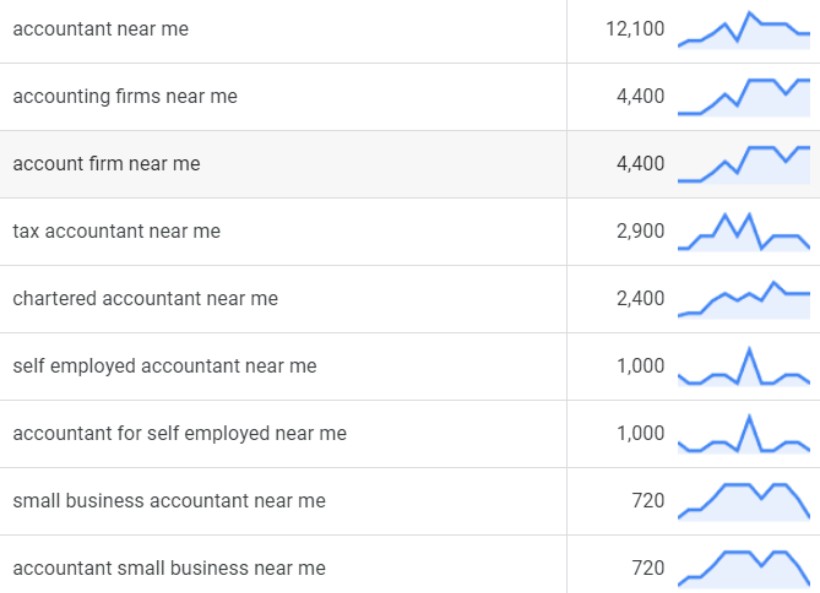Search Engine Optimisation (SEO) is a digital marketing method.
The idea with SEO is to get your website to show up in the top search results on Google.
If your ideal customer searches for something related to your business then you want to be one of the first – if not the first – business that pops up.
Otherwise, you might be cast aside to the bottom of the page.
Or heaven forbid, page 2.
In this article, we’ll talk specifically about SEO for financial services and how you can use this useful marketing avenue to your advantage as a financial professional.
Jump Straight In
What is SEO for Financial Services?
Why SEO is Important for Financial Services?
What are the SEO Challenges in the Financial Industry?
How to Implement SEO for Financial Services
The Benefits of SEO for Financial Services
What is SEO for Financial Services?

SEO for financial services involves optimising your financial services website to improve its visibility on search engines like Google.
The goal is to attract more organic (non-paid) traffic from users who are searching for financial products and services.
This process includes several key components, including:
- Identifying Relevant Keywords.
- Content Optimisation.
- Website Speed.
- Mobile Optimisation.
- Local SEO.
- Off-Page SEO.
- Backlink Building.
- And more.
By focusing on these aspects, you can effectively improve your online presence, attract more qualified leads, and ultimately grow your business through organic search traffic.
Why SEO is Important for Financial Services?

SEO is crucial for financial services because it enhances your visibility and credibility in a highly competitive industry.
In an era where consumers increasingly turn to search engines to find financial products and advice, a well-optimised website ensures that a financial service provider ranks prominently in search results.
This not only drives more targeted traffic to the site but also builds trust with potential clients, who often equate high search rankings with reliability and authority.
As financial services rely heavily on client trust and visibility, a solid SEO strategy is essential for standing out in a crowded market and reaching prospective clients efficiently.
What are the SEO Challenges in the Financial Industry?
Here are some of the primary challenges with SEO in financial services:
Compliance Issues
Financial services are subject to strict regulatory requirements regarding the content they publish.
Ensuring compliance with General Data Protection Regulation (GDPR) laws while still creating engaging and informative content can be challenging.
Content Restrictions
Financial advice and promotional content must be carefully crafted to avoid misleading claims or non-compliance with advertising standards, limiting the scope of SEO-friendly content.
Industry Saturation
The financial services sector is highly competitive, with numerous firms vying for top positions in search engine results.
Competing against established players and large financial institutions requires a sophisticated and persistent SEO strategy.
Keyword Difficulty
Popular financial keywords and phrases are often highly competitive, making it difficult to rank them.
Achieving high rankings in such a competitive space requires substantial effort and resources.
Building Authority
Financial services must establish trust and credibility to attract and retain clients.
This requires creating high-quality, authoritative content and acquiring reputable backlinks, which can be challenging in a field where misinformation or low-quality content can harm credibility.
How to Implement SEO for Financial Services

Here’s a step-by-step guide:
Keyword Research for Financial Services
Use tools like Google Keyword Planner, Ahrefs, or SEMrush to find keywords related to financial services, such as “investment advice,” “retirement planning,” and “personal loans.”
Target specific phrases that indicate user intent, such as “best savings account for students” or “how to invest in stocks.”
On-Page SEO
Create high-quality, informative content that answers common questions and provides valuable insights.
Ensure that content is optimised with relevant keywords without keyword stuffing.
Write compelling meta titles and descriptions that include targeted keywords. Ensure they are concise and informative to improve click-through rates.
Use proper heading tags (H1, H2, H3) to organise content logically. This helps both users and search engines understand the structure and importance of the information.
Also, internal links should be used to guide users to related content and improve site navigation. This helps search engines crawl and index your site more effectively.
Technical SEO
Optimise images, leverage browser caching and use a content delivery network (CDN) to ensure fast load times.
Ensure your website is fully responsive and performs well on all devices, especially mobile phones.
Implement HTTPS to secure user data and build trust with visitors. Search engines also favour secure sites.
Create and submit an XML sitemap to help search engines understand your site structure. Use a robots.txt file to guide search engines on which pages to crawl.
Local SEO
Set up and optimise your Google My Business profile with accurate business information, hours of operation, and customer reviews.
Target location-specific keywords such as “financial advisor in Liverpool” or “financial advisor near me.”
Ensure your business is listed consistently across local directories and review sites like Yelp, Bing Places, and industry-specific directories.
Off-Page SEO
Acquire high-quality backlinks from reputable websites. Focus on earning links from authoritative financial websites, industry blogs, and news sites.
Write guest posts for other reputable websites in the financial niche to build authority and generate backlinks.
Promote your content on social media platforms to drive traffic and engagement. Engage with your audience to build a community around your brand.
Content Marketing
Produce whitepapers, e-books, webinars, and guides that provide value to users and establish your business as an authority in the financial sector.
Frequently update your blog with current financial news, trends, and tips to keep the audience engaged and informed.
Create videos explaining complex financial concepts or providing investment tips, and optimise them for search engines and platforms like YouTube.
Analytics and Monitoring
Use tools like Google Analytics and Google Search Console to monitor traffic, user behaviour, and keyword rankings.
Set up goals and conversion tracking to measure the effectiveness of your SEO efforts in driving business results.
Conduct regular SEO audits to identify and fix issues, update strategies, and ensure your site remains optimised.
The Benefits of SEO for Financial Services

Increased Visibility and Traffic
Effective SEO strategies help financial services rank higher in search engine results pages (SERPs), increasing visibility to potential clients.
By optimising for relevant keywords, financial services attract visitors who are actively searching for specific financial products or advice, leading to more qualified leads.
Cost-Effective Marketing
Unlike paid advertising, which stops delivering results when the budget runs out, SEO provides sustainable traffic and leads over the long term.
SEO often delivers a higher return on investment compared to other marketing channels, as it focuses on attracting organic traffic without the ongoing costs of PPC campaigns.
Improved User Experience
SEO involves optimising website structure and content, making it easier for users to navigate and find the information they need.
Ensuring a mobile-friendly site enhances user experience for visitors on smartphones and tablets, which is increasingly important as more users access financial services online.
Most of the users that land on your site will be from mobile so if your site isn’t compatible then you’ll put people off coming to your site.
This will then result in Google ranking your site lower in the search results. Never underestimate user experience when it comes to SEO.
Competitive Advantage
A strong SEO strategy helps financial services stay ahead of competitors by capturing more organic search traffic.
Optimising for local search can help you dominate local markets, attracting clients from specific geographic areas.
The financial services market is one of the most competitive industries out there.
Giving an increased focus on delivering a comprehensive SEO strategy will put you ahead of most of your competitors.
Better Conversion Rates
By attracting visitors who are actively searching for financial services, SEO leads to higher conversion rates compared to broader marketing strategies.
SEO involves creating content that addresses the specific needs and pain points of potential clients, making them more likely to convert.
In financial services, people are searching for options to solve their financial pain points.
With the right SEO strategy, you could convert these users often as your content will be hyper-targeted and solve painful issues your ideal client faces.
Increased Brand Awareness
Consistently appearing in top search results increases brand exposure and recognition among your potential clients.
SEO helps manage and improve the online reputation of your financial services brand by ensuring positive content ranks higher in search results.
Keeping your brand top of mind is important for helping to grow your brand.
SEO is a very sustainable method of organically distributing your brand image online for a significant period.
Allowing the awareness of your brand to spread far and wide.
We Help Financial Services Rank on Google – Blaze Media
Clearly, having an SEO strategy for your financial service business is beneficial.
It can be the difference between standing out from your competitors and getting lost among the noise.
We’re a digital marketing agency that helps financial service businesses create and implement winning SEO strategies.
If you would like more information on how our SEO services can help your business, please reach out to us.


